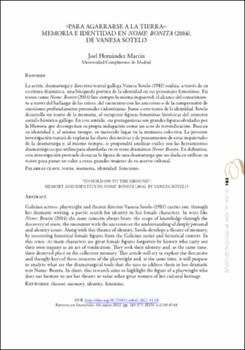«Para agarrarse a la tierra»: memoria e identidad en Nome: Bonita (2014), de Vanesa Sotelo
Author
Hernández Martín, JoelDate
2022Abstract
La actriz, dramaturga y directora teatral gallega Vanesa Sotelo (1981) realiza, a través de su
escritura dramática, una búsqueda poética de la identidad en sus personajes femeninos. En
textos como Nome: Bonita (2014) late siempre la misma inquietud: el alcance del conocimien-
to a través del hallazgo de las raíces, del encuentro con los ancestros o de la comprensión de
cuestiones profundamente personales e identitarias. Junto a este teatro de la identidad, Sotelo
desarrolla un teatro de la memoria, al recuperar figuras femeninas históricas del contexto
social e histórico gallego. En este sentido, sus protagonistas son grandes figuras olvidadas por
la Historia que desempeñan su propia indagación como un acto de reivindicación. Buscan
su identidad y, al mismo tiempo, su merecido lugar en la memoria colectiva. La presente
investigación tratará de explorar las claves discursivas y de pensamiento de estas inquietudes
de la dramaturga y, al mismo tiempo, se propondrá analizar cuáles son las herramientas
dramatúrgicas que utiliza para abordarlas en su texto dramático Nome: Bonita. En definitiva,
esta investigación pretende destacar la figura de una dramaturga que no duda en utilizar su
teatro para poner en valor a otras grandes mujeres de su acervo cultural. Galician actress, playwright and theater director Vanesa Sotelo (1981) carries out, through
her dramatic writing, a poetic search for identity in her female characters. In texts like
Nome: Bonita (2014) the same concern always beats: the scope of knowledge through the
discovery of roots, the encounter with the ancestors or the understanding of deeply personal
and identity issues. Along with this theater of identity, Sotelo develops a theater of memory,
by recovering historical female figures from the Galician social and historical context. In
this sense, its main characters are great female figures forgotten by history who carry out
their own inquiry as an act of vindication. They seek their identity and, at the same time,
their deserved place in the collective memory. This article will try to explore the discursive
and thought keys of these concerns of the playwright and, at the same time, it will propose
to analyze what are the dramaturgical tools that she uses to address them in her dramatic
text Nome: Bonita. In short, this research aims to highlight the figure of a playwright who
does not hesitate to use her theater to value other great women of her cultural heritage.





